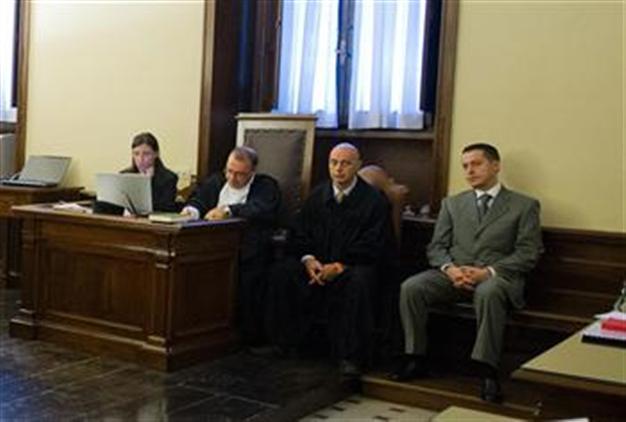Pope's butler gets 18 months in jail in 'Vatileaks' case
VATICAN CITY - Agence France-Presse

ABACA photo
Pope Benedict XVI's former butler Paolo Gabriele today got 18 months in prison for stealing secret documents from the Vatican that reveal fraud and intrigue in the tiny state.Presiding judge Giuseppe Dalla Torre gave the ex-butler three years but immediately reduced the sentence to 18 months on the grounds of his past service rendered to the Catholic Church and his apology to the pope for betraying him.
"In the name of his holiness Pope Benedict XVI, who reigns in glory, and invoking the Holy Trinity... this court sentences the defendant to three years in prison," the judge said as Gabriele looked on impassively.
"Considering the absence of a criminal record, of the subjective though erroneous motivation, and the acknowledgement of having betrayed the trust of the holy father, it reduces the sentence to one year and six months," he added.
Gabriele was found guilty of stealing hundreds of sensitive Vatican documents from the pope's palace, including letters from cardinals and politicians and papers that the pontiff himself had marked "To Be Destroyed".
The Vatican's prosecutor, Nicola Picardi, had called for the former butler to go to jail for three years.
"It was a good sentence," said Gabriele's lawyer Cristiana Arru, who added that she would "have to evaluate" whether her client would appeal the ruling which brought to an end an expeditious trial that began just a week ago.
In his final statement, Gabriele said he had "acted out of visceral love for the Church of Christ and of its leader on earth." "I do not feel that I am a thief," he added, as Arru called on the judge to be lenient on a man who was driven by "a moral motivation" and who had by no means cooked up a "scheme or plot" aimed at damaging the Church or the pope.
The former butler had claimed from the start that he wanted to root out "evil and corruption" at the heart of the Roman Catholic Church after observing that the 85-year-old pontiff was not well informed and perhaps even "manipulated".
Using the codename "Maria", Gabriele met with an Italian journalist over several months and passed him the confidential documents.
He had admitted responsibility for the leaks. While claiming to be "innocent" of the charge of theft, he said he felt "guilty" of betraying the trust the pope had placed in him.
The personal letter he wrote to Benedict to ask for his forgiveness no doubt influenced the judge's decision to cut his sentence in half.
Many experts have said he may receive a pardon from the pope, who has been following the case closely.
'Sensitive papal papers'
Vatican gendarmes said their search of Gabriele's home in the Vatican had revealed more than 1,000 sensitive papal papers as well as a huge amount of printed material about freemasonry, spying techniques and Vatican finances.
Gabriele has alleged he was mistreated by the gendarmes when he was held for 53 days in two "security rooms" at the Vatican, complaining that the lights were kept on for 24 hours a day for the first three weeks of his detention.
Gianluigi Nuzzi, the Italian journalist to whom Gabriele has admitted passing the documents, called the butler "courageous" and said he wants an inquiry into the allegations in the papers and not into how they were leaked.
The documents published in Nuzzi's book "His Holiness: The Secret Papers of Benedict XVI" contained allegations of fraud in the running of the city state and cloak-and-dagger intrigue among the pope's closest collaborators.
Many of the documents contain barbs against the Vatican's powerful Secretary of State Tarcisio Bertone, a divisive figure who has expanded his powers since being appointed by the pope in 2006 and is challenged by some leading prelates.
The trial took place in a courtroom decorated with a portrait of the pope and Vatican insignia in a part of the Holy See that is strictly off limits to the millions of tourists and pilgrims who visit St Peter's every year.
The Vatican's criminal law dates back to the 19th century and the pope holds wide powers including the right to dismiss a case at any point during a trial.
The fact that the pope has not done so and that journalists have been allowed into the courtroom shows a desire for transparency, some experts say.
The trial has also offered a rare glimpse into the daily life of the "pontifical family" made up of the pope's secretaries and domestic staff.
















